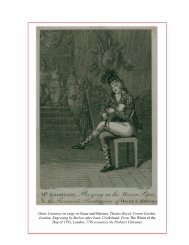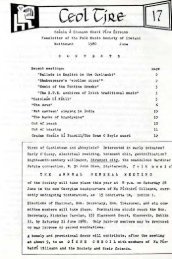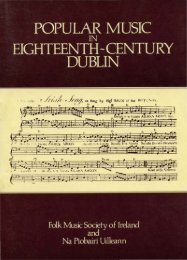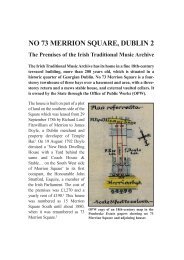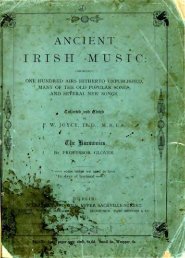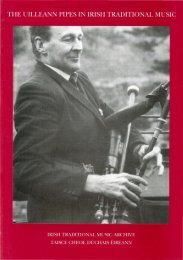Union Pipes - Irish Traditional Music Archive
Union Pipes - Irish Traditional Music Archive
Union Pipes - Irish Traditional Music Archive
Create successful ePaper yourself
Turn your PDF publications into a flip-book with our unique Google optimized e-Paper software.
COUrTney’S ‘UnIOn PIPeS’ AnD The TerMInOlOgy OF IrISh BellOWS-BlOWn BAgPIPeS 32<br />
One newspaper correspondent, styling himself ‘The ghost of Carolan’<br />
and complaining about Courtney’s stage costume in Oscar and Malvina,<br />
incidentally confirms his nationality and that of his pipes:<br />
As an <strong>Irish</strong>man, give me leave to observe, that in the representation of<br />
Oscar and Malvina the <strong>Irish</strong> pipes are introduced; but why the piper should<br />
be habited in a highland dress, I cannot reconcile to my feelings... now,<br />
by my shoul, I tink an <strong>Irish</strong>man playing so well upon the pipes as little<br />
C——y, should not be ashamed of his brogues, and let the music give his<br />
Scotch bonnet the lie. 95<br />
now known for their duets in Oscar and Malvina, Courtney and<br />
Weippert had begun to perform together as entr’acte entertainment in<br />
variety productions, such as Collin’s Evening Brush at the lyceum in<br />
the Strand during March 1792. 96 In May 1792 Courtney is having another<br />
benefit in the Crown and Anchor and playing ‘an entire new<br />
Concerto on the <strong>Union</strong> <strong>Pipes</strong> by Mr. reeve, who Composed the<br />
95<br />
Morning Post and Daily Advertiser, london, 8 nov. 1791. There must be a suspicion<br />
that the writer was the <strong>Irish</strong> actor and humorous dramatist John O’Keefe,<br />
who, as said, had been introducing Carolan tunes to london audiences since the<br />
early 1780s, sometimes in collaboration with Shield, the part-composer of Oscar<br />
and Malvina (see O’Keefe 1826: II, 49,70–1, 77; Fiske 1986: 274, 459, 600–12<br />
and passim). O’Keefe was interested in the <strong>Irish</strong> pipes: he had introduced the<br />
piper James MacDonnell to Cork stage audiences in 1774 (Carolan 1984: 59–61)<br />
and had pipers as characters in his 1783 stage production The Shamrock<br />
(O’Keefe: II, 49; Fiske 1986: 459). The dilemma faced by the musical directors<br />
of Oscar and Malvina – of wanting to represent Scottish pipes on stage, but<br />
being unable to use highland pipes because their confined melodic range and<br />
their unique temperament (those features which are the very basis of their character<br />
and attraction) prevented them playing melodies of extended range and<br />
playing in concert with other theatre instruments – is a familiar one. It is usually<br />
solved nowadays, from the television series Kidnapped to the film Braveheart,<br />
by using <strong>Irish</strong> uilleann pipes off-screen.<br />
96<br />
Morning Chronicle, london, 29 Mar. 1792 etc. See also Morning Herald,<br />
london, 19 May 1792 (in The <strong>Irish</strong>man in London); and Morning Herald,<br />
london, 26 May 1792 (in Kean’s Evening Lounge).



